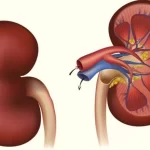What is chronic kidney disease (CKD)?
In chronic kidney disease (CKD), both kidneys take months to years to deteriorate. At its onset, there are no symptoms due to a lack of functionality in both kidneys. But as the kidneys start getting worse, the patient’s discomfort increases gradually.
Symptoms of chronic kidney disease (CKD)
Symptoms of chronic kidney disease vary depending on the severity of kidney damage. CKD is divided into five stages. These divisions are based on the rate of kidney function or the level of eGFR. Estimates of eGFR are determined by the amount of creatinine in the blood. Generally, eGFR is more than 90ml / min.
Chronic kidney disease (CKD)First stage
In the first stage of chronic kidney disease, the efficiency of the kidney is 90 – 100%. In this case, the eGFR is greater than 90 ml/min and no symptoms are seen in the patients. There may be abnormalities in urine, such as loss of protein in the urine. Escare M. R I, CT scan, or sonography may cause kidney failure or CKD. The name of the disease is detected.
Chronic kidney disease (CKD)Second stage
It consists of eGFR 60 to 89 ml. / minute. No symptoms of any kind are found in these patients. But some patients may complain of frequent urination or high blood pressure at night. There may be some abnormalities in his urine test and a slightly increased amount of serum creatinine in the blood test. Blood pressure in chronic kidney disease patients may increase very much.
Chronic kidney disease (CKD)Third phase
This includes eGFR 30 to 59 ml. / minute. Patients can often present without any symptoms or with mild symptoms. There may be some abnormalities in his urine test and a slight increase in serum creatinine in the blood test.
Chronic kidney disease (CKD)Fourth stage
In the fourth stage of chronic kidney disease, eGFR means that the efficiency of the kidney is 15–29 min. There may be a decrease of up to Rs. Symptoms can now be mild, unclear, and uncertain or even very intense. It depends on the root causes of kidney failure and the associated disease.
Chronic kidney disease (CKD)Fifth stage (less than 15% kidney function)
CKD The fifth stage is very serious. This may cause eGFR, ie, reduced kidney function by 15%. This is called the last stage of kidney disease. In such a condition the patient may require dialysis or kidney transplant. Symptoms in the patient may be spastic or acute and their life-threatening and complications may increase. Common Symptoms of End-Stage Kidney Disease The symptoms and severity of kidney failure vary in each patient.
Symptoms of Chronic kidney disease (CKD)
- Anorexia, vomiting, nausea.
- Feeling weakness, loss of weight.
- Swelling of the lower legs
- Swelling around the eyes and face often in the morning
- Feeling exhausted, breathlessness at work.
- Blood discoloration (anemia). Due to deficiency in the hormone called erythropoietin produced in the kidneys, blood in the body is reduced.
- Itching in the body.
- Lower back pain.
- Frequent urination (nocturia) especially at night.
- Loss of memory, change in the regular order of sleep.
- Hypertension does not come under control even after taking the medicine.
- Irregularity in women and impotence in men.
- Decreased active vitamin ‘D’ produced in the kidney, which increases the height of children and causes pain in bones in adults.
- Anorexia, weakness, and nausea in food are the main symptoms of most patients of chronic kidney disease.
Chronic kidney disease (CKD)
- If a person has high blood pressure then CKD There are chances of having high blood pressure if less than 30 or above 50 years of age are detected.
- Have severe hypertension (200/120 mm of Hg) at the time of diagnosis.
- Irregular hypertension despite regular treatment.
- Impaired vision.
- Protein in the urine.
- The presence of symptoms that cause CKD shows possibilities like swelling in the body, loss of appetite, weakness, etc.
- Final stage CKD What are the complications of?
- Chest pain due to excessive breathing and water in the lungs (pulmonary edema).
- Having severe hypertension.
- Nausea and vomiting.
- A feeling of excessive weakness.
- Complications in the central nervous system such as jerking, excessive sleepiness, cramps, and coma.
- Increased potassium in the blood (hyperkalemia). It can affect the ability of the heart to function and can also be life-threatening.
- Pericarditis. Inflammation or watering in the sac-like membrane that surrounds the heart. It obstructs the function of the heart and can cause extreme pain in the chest.
- Kidney disease can also occur due to no improvement in blood fade despite taking medicine.
Diagnosis of chronic kidney disease (CKD)
CKD does not show any kind of symptoms. CKD is detected when high blood pressure is tested, increased blood serum creatinine, or albumin is detected in urine tests. Every person, C.K. There should be a check for D.D. who has high chances of kidney damage (diabetes, high blood pressure, old age, CKD in other family members, etc.).
- If any patient is suffering or suspected of having kidney disease during the examination, then a diagnosis can be made by the following tests.
- This amount is less in patients with chronic kidney disease. Anemia or anemia is due to a decrease in the production of a hormone called erythropoietin by the kidney.
Protein In Urine
If protein passes in the urine, it may be the first dreaded sign of chronic kidney disease. It is also true that the release of protein in urine occurs due to reasons other than kidney disease. It should not be assumed that the transfer of protein in urine is a case of chronic kidney disease. A diagnosis of urine infection can also be made by this test.
High Blood Pressure and Protein in the Urine
For the diagnosis and treatment of chronic kidney disease, high blood pressure, and protein in urine can be the first sign of this disease. The most important test is. In addition to excessive kidney damage, the amount of creatinine and urea in the blood also increases.
In kidney disease patients, by doing this test in a regular period, it is informed that how bad the kidney has become and how much it has improved with the treatment. Serum creatinine, along with age and sex, is used to estimate the kidney’s eGFR, ie, its performance. CK based on eGFR D. is divided into five stages. This division is useful for additional tests and suggestions for appropriate treatment.
Kidney Sonography:
This investigation, called the third eye of kidney doctors, is very important for the diagnosis of what caused the kidney to become defective. Kidney size becomes small and narrow in most chronic kidney disease patients. When the kidney becomes defective due to diseases like acute kidney failure, diabetes, amyloidosis, the size of the kidney is shown to increase.
Sonography can also correctly diagnose the causes of kidney disease such as stones, urethral obstruction, and polycystic kidney disease.
Various tests
CKD This causes disturbances in various kidney functions. Various tests are performed to evaluate these defects-
Eg – electrolyte and acid-base balance test (sodium, potassium, magnesium, bicarbonate), anemia test (hematocrit, ferritin, transferrin saturation, peripheral smear), test for bone disease (calcium, phosphorus, alkaline phosphates, parathyroid hormone), Other other common tests (serum albumin, cholesterol, triglycerides, blood glucose levels, hemoglobin NIN, ECG and echocardiography), etc. In sonography, if both kidneys appear small and shrunk, then it is a sign of chronic kidney disease.
When should contact a doctor?
Chronic Kidney Disease patient should contact the doctor immediately if he has any of the following symptoms –
- Weight gain without reason, a significant decrease in urine volume, increased swelling, difficulty in breathing, or shortness of breath when lying in bed.
- Chest pain, very slow or fast heartbeat. Fever, severe diarrhea, a considerable loss of appetite, severe vomiting, vomiting blood, unprovoked weight loss, etc.
- Severe muscle weakness. Confusion, drowsiness, or fainting or cramps in the body. Urination of red color, excessive bleeding, etc. Well-controlled hypertension disturbances etc.






